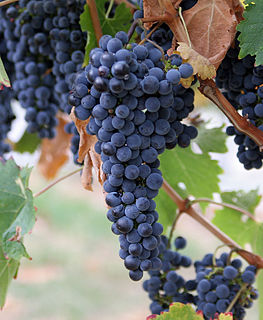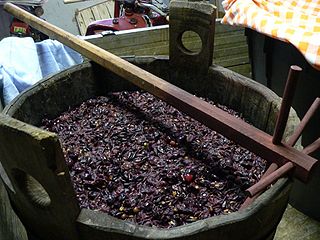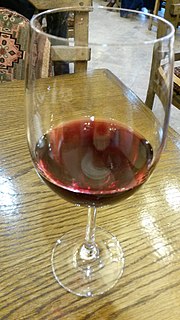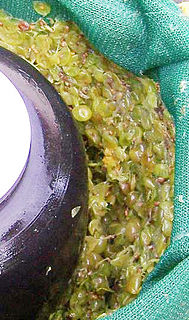
A grape is a fruit, botanically a berry, of the deciduous woody vines of the flowering plant genus Vitis.

Mulled wine, also known as spiced wine, is a beverage usually made with red wine along with various mulling spices and sometimes raisins. It is served hot or warm and is alcoholic, although there are non-alcoholic versions of mulled wine. It is a traditional drink during winter, especially around Christmas.

The Concord grape is a cultivar derived from the grape species Vitis labrusca that are used as table grapes, wine grapes and juice grapes. They are often used to make grape jelly, grape juice, grape pies, grape-flavored soft drinks, and candy. The grape is sometimes used to make wine, particularly kosher wine. Traditionally, most commercially produced Concord wines have been finished sweet, but dry versions are possible if adequate fruit ripeness is achieved. The grape is named after the town in Massachusetts where it was developed.

Sangria is an alcoholic beverage. A punch, the sangria traditionally consists of red wine and chopped fruit, often with other ingredients such as orange juice or brandy.

Winemaking or vinification is the production of wine, starting with the selection of the fruit, its fermentation into alcohol, and the bottling of the finished liquid. The history of wine-making stretches over millennia. The science of wine and winemaking is known as oenology. A winemaker may also be called a vintner. The growing of grapes is viticulture and there are many varieties of grapes.

Must is freshly crushed fruit juice that contains the skins, seeds, and stems of the fruit. The solid portion of the must is called pomace and typically makes up 7–23% of the total weight of the must. Making must is the first step in winemaking. Because of its high glucose content, typically between 10 and 15%, must is also used as a sweetener in a variety of cuisines. Unlike commercially sold grape juice, which is filtered and pasteurized, must is thick with particulate matter, opaque, and comes in various shades of brown and purple.

Fruit wines are fermented alcoholic beverages made from a variety of base ingredients ; they may also have additional flavors taken from fruits, flowers, and herbs. This definition is sometimes broadened to include any fermented alcoholic beverage except beer. For historical reasons, mead, cider, and perry are also excluded from the definition of fruit wine.

Pomace, or marc, is the solid remains of grapes, olives, or other fruit after pressing for juice or oil. It contains the skins, pulp, seeds, and stems of the fruit.

Red wine is a type of wine made from dark-colored (black) grape varieties. The actual color of the wine can range from intense violet, typical of young wines, through to brick red for mature wines and brown for older red wines. The juice from most purple grapes is greenish-white, the red color coming from anthocyan pigments present in the skin of the grape; exceptions are the relatively uncommon teinturier varieties, which produce a red-colored juice. Much of the red-wine production process therefore involves extraction of color and flavor components from the grape skin.

Minute Maid is a product line of beverages, usually associated with lemonade or orange juice, but which now extends to soft drinks of many kinds, including Hi-C. Minute Maid is sold under the Cappy brand in Central Europe and under the brand "Моя Семья" in Russia and the Commonwealth of Independent States. Minute Maid was the first company to market orange juice concentrate, allowing it to be distributed throughout the United States and served year-round. The Minute Maid Company is owned by The Coca-Cola Company, the world's largest marketer of fruit juices and drinks. The firm opened its headquarters in Sugar Land Town Square in Sugar Land, Texas, United States, on February 16, 2009; previously it was headquartered in the 2000 St. James Place building in Houston.

A winepress is a device used to extract juice from crushed grapes during wine making. There are a number of different styles of presses that are used by wine makers but their overall functionality is the same. Each style of press exerts controlled pressure in order to free the juice from the fruit. The pressure must be controlled, especially with grapes, in order to avoid crushing the seeds and releasing a great deal of undesirable tannins into the wine. Wine was being made at least as long ago as 4000 BC; in 2011, a winepress was unearthed in Armenia with red wine dated 6,000 years old.

V8 Vegetable Juice, sometimes just called V8, is a trademarked name for a number of beverage products sold worldwide that are made from eight vegetables, or a mixture of vegetables and fruits. Since 1948, the brand has been owned by the Campbell Soup Company.

Aguardiente is a generic term for alcoholic beverages that contain between 29% and 60% alcohol by volume (ABV). The word is a compound of the Romance languages' words for "water" and "burning"/"fiery", similarly to the English term firewater. Both aguardiente and brandy—from the Dutch expression for "burnt wine"—originated as terms for distilled spirits using whatever ingredients were available locally.

Schorle is a German beverage made by diluting juice or wine with carbonated water or lemonade. The most common variety is Apfelschorle. Large bottles of Schorle can be found at most grocers, stores, supermarkets and anywhere else where carbonated drinks are sold, next to the soda. Due to its dilution it is less sweet or alcoholic than the original beverage, making it better suited as a refreshment on hot summer days or as an alternative to beer at the biergarten or weinstube.

Grape juice is obtained from crushing and blending grapes into a liquid. In the wine industry, grape juice that contains 7–23 percent of pulp, skins, stems and seeds is often referred to as "must". The sugars in grape juice allow it to be used as a sweetener, and fermented and made into wine, brandy, or vinegar.

The following outline is provided as an overview of and topical guide to wine:

Frontenac is an interspecific hybrid grapevine that is a result of research and cross-breeding by the University of Minnesota. It was grown from a crossing of the complex interspecific hybrid Landot 4511 and a very cold hardy selection of Vitis riparia. It was released in 1996.
J2O is a still soft drink made from fruit juices. It is manufactured by Britvic and sold in the United Kingdom and Ireland. Its launch in 1998 was led by Sheraz Dar who joined Britvic in 1994, and was aimed at providing an alternative solution for people who were going out to bars and clubs but were not drinking alcoholic beverages. The name J2O is a pun on the chemical formula for water, H2O, chosen due to the drink's 50% fruit juice content. The first flavours available were Orange & Passion fruit, Apple & Mango and Apple & Melon, but the range has progressively grown since.

Juice is a drink made from the extraction or pressing of the natural liquid contained in fruit and vegetables. It can also refer to liquids that are flavored with concentrate or other biological food sources, such as meat or seafood, such as clam juice. Juice is commonly consumed as a beverage or used as an ingredient or flavoring in foods or other beverages, as for smoothies. Juice emerged as a popular beverage choice after the development of pasteurization methods enabled its preservation without using fermentation. The largest fruit juice consumers are New Zealand and Colombia. Fruit juice consumption on average increases with country income level.


















